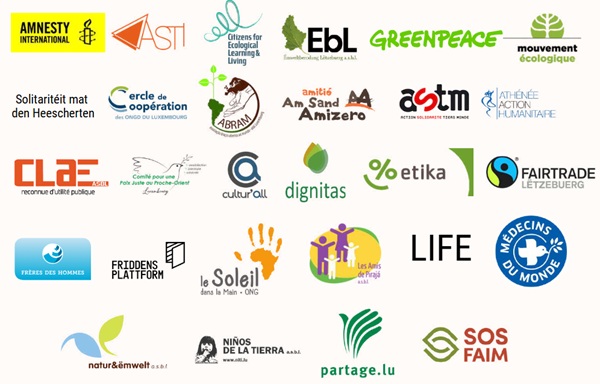
On Friday 25 April 2025, the organisation Citizens for Ecological Learning and Living (CELL) announced that a total of 28 civil society organisations (CSOs) have united to become official under Voĉo.
Its members represent environmental, social, human rights and international solidarity causes who they explain "are speaking with a common voice to make themselves better heard by political and economic decision-makers, the media and society as a whole".
On 7 October 2024, 33 civil society organisations in Luxembourg published an appeal reiterating the importance of civic engagement in defending democracy (freedom of expression and association) and in addressing the challenges facing our society, such as the ecological crisis, the migrant reception crisis and the fight against poverty. Emphasising their solidarity with Caritas beneficiaries and employees, these organisations from all parts of Luxembourg society unanimously called for greater respect, more discernment, more support, more attentiveness and more involvement from the government. They also emphasised the need to guarantee and protect an open and vibrant civic space in Luxembourg.
Following this call, the signatories created a coordination platform to maintain the unity and legitimacy of civil society in Luxembourg in the face of ongoing threats to civic space. The organisations share common questions and challenges, for example regarding the consequences of the reform of the non-profit organisation law, potential changes to laws regarding the right to demonstrate, or public interventions by ministers and politicians questioning the legitimacy and work of civil society organisations.
This platform is called Voĉo, which comes from Esperanto and means "voice." Voĉo refers to the broad alliance of Luxembourg civil society united within the platform as the polyphonic voice of civil society. The name "Voĉo" is inspired by the very origin of Esperanto, a language made up of several languages, and therefore metaphorically expresses being a voice made up of many voices.
Voĉo is engaged in political advocacy and citizen activism led by civil society and societal advocacy work. It is not the voice of state service providers. It is dedicated to defending the voices of civil society, in all its nuances. Voĉo's mission is to unite Luxembourg's broad civil society, to enable it to coordinate, and to act as a force for proposals on issues of common interest, particularly for the defence and strengthening of civic space in Luxembourg.
In addition to structuring the coalition, Voĉo has addressed the government on several occasions. On 10 January, a Voĉo delegation attended a meeting with the Prime Minister at his invitation. Voĉo welcomed the constructive meeting and expects concrete and positive results from this initial exchange, emphasising that constructive dialogue is essential to ensure the fundamental values of justice, sobriety, solidarity and social inclusion.
In March 2025, Voĉo members submitted opinions on a draft bill, or preliminary draft, that directly impacts their working conditions and human rights.
According to Voĉo, the "Strengthened Places of Abuse" bill aims to keep beggars and the homeless away from city centres and villages. Contrary to the principles of predictability and proportionality, which constitute the foundations of the European Convention on Human Rights, granting excessive powers to the police, and particularly to the mayor, and excluding any appeal, it encourages arbitrary action against the poorest. Voĉo considers this bill to be repressive.
Also, according to Voĉo, the draft law on open-air gatherings in publicly accessible places, as drafted, constitutes a real threat to freedom of assembly and expression by introducing disproportionate restrictions and granting excessive powers to local authorities. These measures, if adopted in their current form, would set a worrying precedent by restricting democratic space and deterring the collective expression of citizens' demands. However, in a democratic society, protest and public mobilisation should not be seen as a threat to be neutralised, but as an essential component of public debate and political pluralism. In addition to addressing political decision-makers through opinions and regular meetings, Voĉo encourages collective work among its members and their empowerment, particularly on the issue of the non-profit law, which seems to be increasingly revealing itself as a hindrance to community life. In the coming months, various reflection sessions are planned to establish a common position. The initiative also remains open to any civil society organization that shares its principles of action and wishes to contribute to making the voice of civil society and a vibrant democracy heard more loudly and clearly.
Voĉo continues to closely monitor the investigations into the Caritas case by the courts, the Chamber of Deputies and the media. Beyond Caritas's internal deficiencies, these investigations reveal systemic flaws — particularly at the banking level — that contributed to the collapse of this central player in Luxembourg's social model. These flaws, as well as the possibility that the government will seek to address them by imposing an administrative burden on CSOs, threaten civil society's opportunities for engagement and risk contributing to the shrinking of civic space. Voĉo remains dedicated to ensuring that these concerns of CSOs are heard by political decision-makers, and will seek to maintain the constructive dialogue around the foundations of democracy in Luxembourg that has been initiated with them since the beginning of the year.








